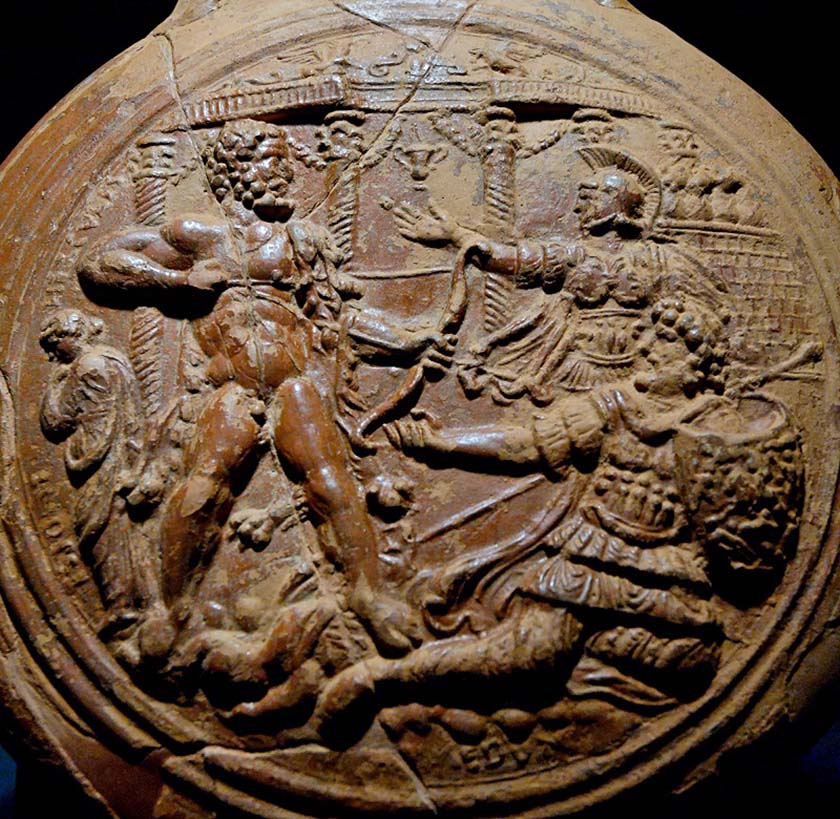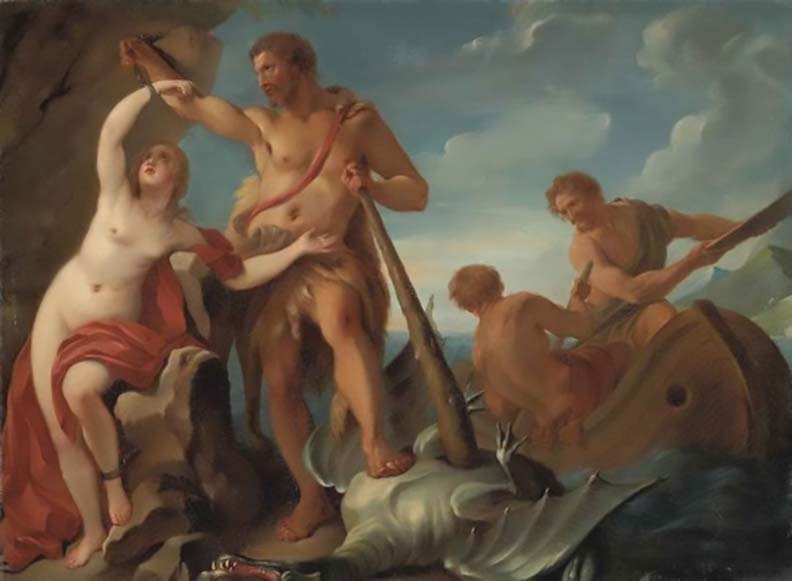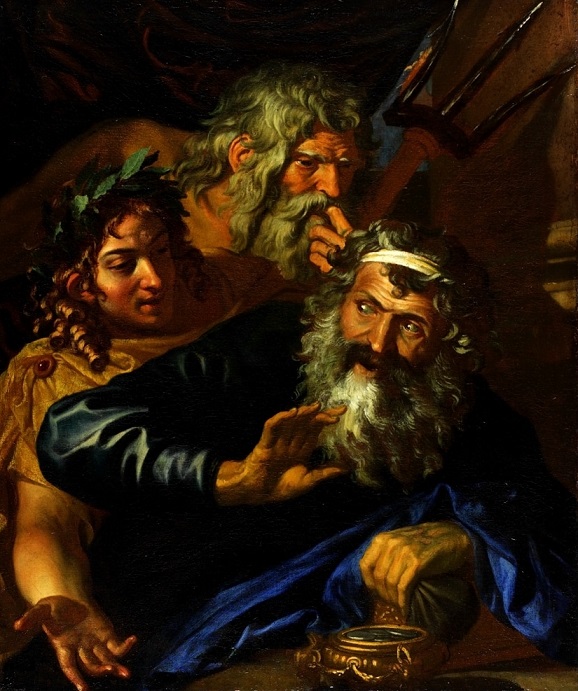Laomedon
Laomedon the son of Hercules
Before going to talk about Laomedon, the king of Troy; there is also one other Laomedon who is the son of Hercules and Meline, daughter of Thespius.
The original text of Apollodorus (2.7.8), goes as follows:
ἦσαν δὲ παῖδες αὐτῷ ἐκ μὲν τῶν Θεσπίου θυγατέρων, [...] Μηλίνης Λαομέδων...
Laomedon king of Troy
In Greek mythology, Laomedon (Ancient Greek: Λαομέδων) was a Trojan king, son of Ilus (the founder of the city of Ilium) and thus nephew of Ganymede and Assaracus.
Ilium would eventually be renamed as Troy, a name given to honour Tros, the father of Ilus, and thus grandfather of Laomedon. This lineage means that Laomedon was a direct descendant of Dardanus and an important member of the House of Troy.
As a son of Ilus, Laomedon was therefore a nephew of Ganymede and Assaracus. The mother of Laomedon is variously given as Eurydice, a daughter of King Adrastus of Argos, or a woman called Leucippe. Laomedon therefore, probably had two sisters, Themiste and Telecleia.
Laomedon was the father of Priam, Astyoche, Lampus, Hicetaon, Clytius, Cilla, Proclia, Aethilla, Medesicaste, Clytodora, and Hesione. Tithonus is also described by most sources as Laomedon's eldest legitimate son, and most sources omit Ganymede from the list of Laomedon's children, but indicate him as his uncle instead.
Laomedon's possible wives are Placia, Strymo (or Rhoeo), and Leucippe; by the former he begot Tithonus and by the latter King Priam. He also had a son named Bucolion by the nymph Calybe, as recounted by Homer in the Iliad (6.22). Dictys Cretensis (4.22) added Thymoetes to the list of Laomedon's children.
The Magical Horses
Laomedon owned several horses with divine parentage that Zeus had given Tros (Laomedon's grandfather) as compensation for the kidnapping of Ganymede. Anchises secretly bred his own mares from these horses.
According to one story, Tros's son, Ganymede, was kidnapped by Zeus, who had fallen in love with the beautiful boy. Tros grieved for his son. Sympathetic, Zeus sent Hermes with two horses so swift they could run over water.
Hermes also assured Tros that Ganymede was immortal and would be the cupbearer for the gods, a position of much distinction.Tros, was an earlier King of Troy and grandfather of Laomedon (making him an uncle to Laomedon). Laomedon himself was the son of Ganymede's brother Ilus, the son of Tros

The Wrath of gods
The name of Laomedon comes to the fore in a time when the Greek gods Apollo and Poseidon were to be found wandering the earth. The pair of gods had been punished by Zeus for rebellious intentions, and exiled from Mount Olympus for a year.
Apollo and Poseidon came to Troy seeking employment, and thus Apollo was put in charge of King Laomedon’s livestock, whilst Poseidon was tasked with building up the walls of Troy.
The mere presence of Apollo around the livestock, was sufficient for twins to be born to each pregnant animal, and the work of Poseidon, saw impenetrable walls constructed. Poseidon though, did not construct the walls alone, and he was assisted by Aeacus, the mortal king of Aegina. The sections of wall constructed by Aeacus would subsequently prove to be less secure than those made by Poseidon.
After their work was complete, Apollo and Poseidon presented themselves before King Laomedon to obtain their pay for work undertaken. King Laomedon though, decided not to pay his two employees, and instead banished the pair from his realm.
In retribution for the arrogance of Laomedon, Apollo sent down Pestilence upon Troy, whilst Poseidon sent forth a sea-monster, the Trojan Cetus, to ravage the land around Troy.
To placate the sea-monster and curtail the pestilence, the people of Troy would periodically have to sacrifice one of the maidens of the city; the sacrificial maiden being chosen by lots.
The oracles foretold deliverance from these calamities if Laomedon would expose his daughter Hesione to be devoured by the sea monster. The king then exposed her by fastening her to the rocks near the sea. But by chance, after fighting the Amazons, Heracles, who had landed at Troy, saw the girl to be sacrificed.
The hero promised to save the princess on condition of receiving from Laomedon the mares which Zeus had given in compensation for the rape of Ganymede. When Laomedon agreed, Heracles (along with Oicles and Telamon) killed the monster and rescued Hesione at the last minute. But when Laomedon would not give up his magical horses for their deeds, the hero put to sea after threatening to make war on Troy.
The Siege of Heracles
Heracles was obviously angry about the actions of King Laomedon, but before he did anything he first had to return to Eurystheus for he was still undertaking one of his twelve Labours. Later though, Heracles would return with 6 ships of men, the hero Telamon included, and laid siege to Troy.
The walls at first held strong, but then the wall, at a point constructed by Aeacus, Telamon's father, fell, and Heracles and his men entered Troy (Telamon was the first to breach the wall and enter the city and after him Heracles). It is normally stated that Heracles killed the treacherous Laomedon, and all of his sons, bar Tithonus, who was not present, and Podarces.
Heracles assigned Hesione as a war prize to Telamon (by whom he had a son called Teucer by her) and allowed her to take with her whomsoever of the captives she would. When Hesione chose Podarces, Heracles said that her brother must first be a slave and then be ransomed by her.
So, when the prince was being sold, Hesione took the golden veil from her head and gave it as a ransom; hence Podarces was thereafter called Priam (from priamai "to buy").
Priam would be placed upon the throne of Troy by Heracles, and so the son of Laomedon succeeded his father, all be it in a strange manner.
The Tomb of Laomedon
It was said that the tomb of Laomedon was located by the Scaean Gate of Troy. In some versions of the Trojan War it was said that the city of Troy could not fall whilst the tomb was intact. The tomb though was damaged when the gateway was enlarged by the Trojans to allow the Wooden Horse into the city, and of course Troy would shortly afterwards fall to the Achaean forces.
Some sources make reference to the tomb of Laomedon being further desecrated during the Sacking of Troy, with the body for the former king removed from the tomb, possibly by Sinon.

Sources
Apollodorus and Hyginus p. 63
Homer, Iliad
Apollodorus and Hyginus p. 34
Scholiast on Homer. Iliad, xxi.444 and Tzetzes. Scholiast on Lycophron 34 (as noted in Pseudo-Apollodorus. Bibliotheca, 2.5.9, Note 2)
The conspirator-gods: Poseidon, Hera, and Athena but Apollo was not mentioned in Homer's Iliad, 1.399ff.
Pseudo-Apollodorus. Bibliotheca, 2.5.9
Apollodorus and Hyginus pp. 38–39
"Wikipedia"













